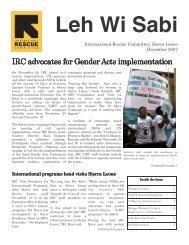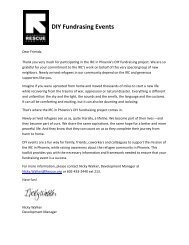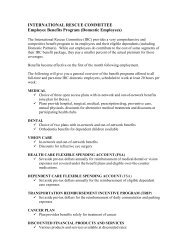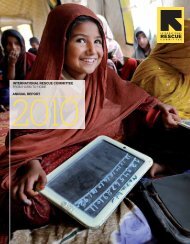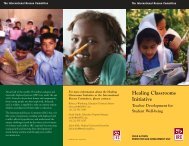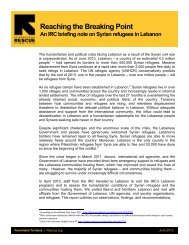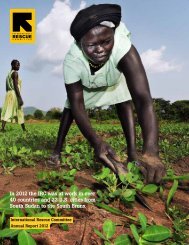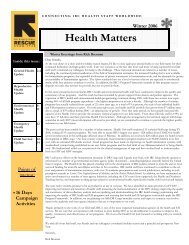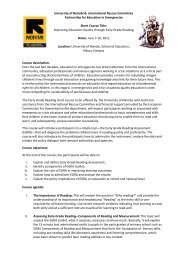The Issues and Assets of African Youth on Staten Island's North Shore:
The Issues and Assets of African Youth on Staten Island's North Shore:
The Issues and Assets of African Youth on Staten Island's North Shore:
- No tags were found...
Create successful ePaper yourself
Turn your PDF publications into a flip-book with our unique Google optimized e-Paper software.
Table 2: Adult Literacy in West AfricaCountry Female(% 15+)1995-2005Male(% 15+)1995-2005HumanDevelopmentRank(out <str<strong>on</strong>g>of</str<strong>on</strong>g> 179countries)Liberia 45.7% 58.3% 176Sierra24.2 % 46.7% 179Le<strong>on</strong>eGuinea 18.1 % 42.6% 167Ghana 49.1 % 66.4% 142Nigeria 60.1 % 78.2% 154Source: UNDP, http://hdr.undp.org/en/Ec<strong>on</strong>omic dem<str<strong>on</strong>g>and</str<strong>on</strong>g>s <str<strong>on</strong>g>and</str<strong>on</strong>g> limited opti<strong>on</strong>sMany <str<strong>on</strong>g>African</str<strong>on</strong>g> parents have very limited time available tointeract with their children‟s teachers, after-school programleaders, <str<strong>on</strong>g>and</str<strong>on</strong>g> others because <str<strong>on</strong>g>of</str<strong>on</strong>g> the financial dem<str<strong>on</strong>g>and</str<strong>on</strong>g>s <strong>on</strong>them are large compared to their earning power. <str<strong>on</strong>g>The</str<strong>on</strong>g>y aresupporting not <strong>on</strong>ly their family in the United States, but alsoimmediate <str<strong>on</strong>g>and</str<strong>on</strong>g> extended family back home. Many work l<strong>on</strong>ghours <str<strong>on</strong>g>and</str<strong>on</strong>g>/or multiple jobs.A significant number <str<strong>on</strong>g>of</str<strong>on</strong>g>parents work in the homehealth field. <str<strong>on</strong>g>The</str<strong>on</strong>g>se jobs<str<strong>on</strong>g>of</str<strong>on</strong>g>fer relatively competitivewages <str<strong>on</strong>g>and</str<strong>on</strong>g> opportunity forovertime for individualswithout a high level <str<strong>on</strong>g>of</str<strong>on</strong>g>formal educati<strong>on</strong>, <str<strong>on</strong>g>and</str<strong>on</strong>g>social networks provide alink to jobs.“Kids are left al<strong>on</strong>e inapartments to care forthemselves while theirparents are out working.Some <str<strong>on</strong>g>of</str<strong>on</strong>g> these parentsdo live-in [work] <str<strong>on</strong>g>and</str<strong>on</strong>g> areg<strong>on</strong>e for days.”Parent focus group, 3/24/09.Home health jobs play a vital role in the ec<strong>on</strong>omic well-being<str<strong>on</strong>g>of</str<strong>on</strong>g> the <strong>North</strong> <strong>Shore</strong> <str<strong>on</strong>g>African</str<strong>on</strong>g> community. However, the reliance<strong>on</strong> this sector strains families <str<strong>on</strong>g>and</str<strong>on</strong>g> the community. Homehealth jobs are physically dem<str<strong>on</strong>g>and</str<strong>on</strong>g>ing <str<strong>on</strong>g>and</str<strong>on</strong>g> characterized byvery l<strong>on</strong>g hours, overnight shifts or live-in arrangements.Some assessment participants reported that home healthemployers exploit their <str<strong>on</strong>g>African</str<strong>on</strong>g> employees, who they knowhave limited job opti<strong>on</strong>s.Some parents may prioritize work over being involved intheir children‟s activities because <str<strong>on</strong>g>of</str<strong>on</strong>g> their life experience.Many who lived through war or in refugee camps wereseparated from their families <str<strong>on</strong>g>and</str<strong>on</strong>g> had to find ways to supportthemselves <str<strong>on</strong>g>and</str<strong>on</strong>g> others at an early age. One fatherc<strong>on</strong>cluded that the war‟s impact <strong>on</strong> Liberia parents whenthey were young is having sec<strong>on</strong>dary impacts <strong>on</strong> theirchildren <strong>on</strong> the <strong>North</strong> <strong>Shore</strong>:“…Most <str<strong>on</strong>g>of</str<strong>on</strong>g> the kids who traveled to the USAfrom various refugee camps were left al<strong>on</strong>eto take care <str<strong>on</strong>g>of</str<strong>on</strong>g> themselves, or the entirefamily. <str<strong>on</strong>g>The</str<strong>on</strong>g>refore most <str<strong>on</strong>g>of</str<strong>on</strong>g> these kidsbecame adults before they were even kids.And this is all due to the civil war in Liberia;this is also affecting even the kids that areborn today to parents who parentedthemselves during the war, <str<strong>on</strong>g>and</str<strong>on</strong>g> in refugeecamps around the world. During the warparents could not afford to support theirfamily, so their young girls became thebreadwinners for the family, they used theirbody for m<strong>on</strong>ey; I am talking about girlsages 10 <str<strong>on</strong>g>and</str<strong>on</strong>g> above, sleeping with grown upadult men who could be their fathers. Thosevery kids are adult today <str<strong>on</strong>g>and</str<strong>on</strong>g> having children<str<strong>on</strong>g>of</str<strong>on</strong>g> their own, <str<strong>on</strong>g>and</str<strong>on</strong>g> because <str<strong>on</strong>g>of</str<strong>on</strong>g> theirupbringing, they cannot raise kids <str<strong>on</strong>g>of</str<strong>on</strong>g> theirown.” 4444 Parent focus group, <str<strong>on</strong>g>African</str<strong>on</strong>g> father, March 24, 2009.26



